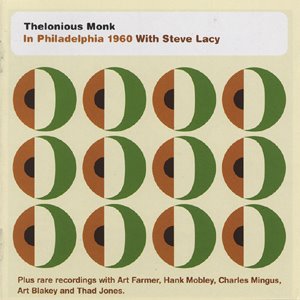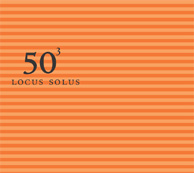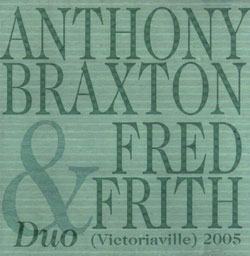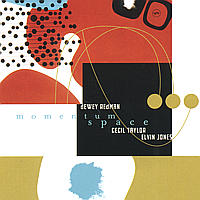 Rare Live Recordings RLR 88623 (2006)
Rare Live Recordings RLR 88623 (2006)The late soprano saxophonist
Steve Lacy made no secret of his admiration of the music of
Thelonious Monk and its influence on his own work. He recorded several albums of Monk's compositions and played with him for a period of time during 1960 that, although brief, had a profound effect on the young jazzman.
Rare Live Recordings has now made available a live recording (originally taped for radio broadcast) of Lacy playing with Monk's quartet. The album also features some previously unissued recordings of Monk in various group formations (including a performance on
The Steve Allen Show with
Charles Mingus on bass). The CD case warns buyers that "the music on this CD comes from non-professional private tapes and its technical sound quality its (sic) not up to today's standards" and a sticker suggests that the album is "only for collectors".
The set featuring Lacy was recorded as a live radio broadcast in March of 1960. Longtime Monk sideman
Charlie Rouse plays tenor sax on these tracks ("Evidence", "Straight, No Chaser", and "Rhythm a Ning") and is joined by
John Ore on bass and
Roy Haynes on drums; he takes the first horn solo on each, followed by Lacy. Lacy's tentative, searching style can already be heard on these early recordings (unfortunately, his solo on "Rhythm a Ning" gets cut off early by overdubbed closing announcements from
Louis Armstrong and
Mitch Miller). The sound quality is not perfect, but it's a lot better than expected from the multiple warnings on the case.
The audio on the second set of recordings, recorded in New York in 1957, is quite nice and bright, with
Thad Jones' trumpet fattening up the sound of Monk's quartet (Rouse, Ore, and drummer
Billy Higgins) on "Blue Monk" and Higgins getting a nice long solo in at the end of a nearly twelve-minute "Evidence". Three tracks from 1948 (with
Art Blakey on drums) follow, and the sound remains quite satisfactory, with
Idrees Sulieman's trumpet cutting through loud and clear on "Just You, Just Me" and "All the Things You Are".
Two performances from the Allen show follow ("Off Minor" and "Well You Needn't") and it is here that the sound quality takes a nosedive; Mingus and Blakey are, for all practical purposes, inaudible, and the recording sounds as if someone held a microphone up to their television set. The tracks are preceded by a brief interview in which Allen attempts to pick Monk's brain regarding his compositional process (with little success). The album closes with a couple of odd pop numbers in which Monk, Blakey, and Sulieman (joined by
Lucky Thompson on tenor and
Curly Russell on bass) accompany a syrupy vocalist by the name of
Frankie Passions. The sound is better here, yet it hardly seems worth it.
Despite the unevenness of the audio and some of the performances,
In Philadelphia 1960 will appeal to both hardcore collectors and average jazz fans alike, and it makes me eager to hear other releases from RLR Records (about which I could find little on the net... hopefully they'll have a website up soon).
 Deutsche Grammophon 4769803 (1988-1991/2006)
Deutsche Grammophon 4769803 (1988-1991/2006)






